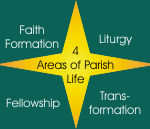Reflecting on Pope Paul IV’s Apostolic Exhortation “On Evangelization in the Modern World” in light of our diocesan document “Discovering Jesus Christ the Path to Freedom”
(Led by Father Bill Burke, Director of the National Liturgy Office of the Canadian Conference of Catholic Bishops)
Handout: “Evangelii Nuntiandi – A few gems”
“There is no doubt that the effort to proclaim the Gospel to the people of today, who are buoyed up by hope but at the same time often oppressed by fear and distress is a service rendered to the Christian community and also to the whole world.”
This is the first paragraph in this Evangelii Nuntiandi (“EN” in these Minutes) in the year 1975, but the sense of being ‘buoyed up by hope and at the same time often oppressed’ is what we too experience today. We are not the only generation dealing with crises! We have a 2000 year history of it! Radcliffe reminds us of that when he points to our very beginnings celebrated every Holy Thursday – beginning with betrayal and abandonment. Christ too knew crisis!
The Acts of the Apostles reveal these beginnings of our Church too. Imagine selling everything you own to live in common with the expectation of waiting a week or two for the coming of Christ. And of course we know that Christ did not come as such. This certainly smashed the expectation of these early Christians! And the story of Emmaus also expresses this: “We had hoped he was the one”; smashed expectations about an earthly kingdom that would come to be and did not. And then we hear how Jesus replied ‘you are slow to understand’ and then opened their hearts and minds. We must understand that we are not the advisory committee of God! We need to recognize “What is”.
We Christians have been dealing with crisis since the beginning. But in order to discern God’s plan throughout it all, we are called to learn to ask the right questions. What is a Christian? How do we make one? Recognize “what is” first. The reality. We have to realize that if the horse we’re riding dies, we are to get off!
(Table discussion on the questions ‘What have we been doing in our parish (as far as faith formation goes) and is it working?’)
Mgr Ebacher: This is very important work that you do here this morning. I was excited when this document came out in 1975. I was a young priest then and was so excited that I even wrote to the Pope to say how beautiful the document was! We all recognize the necessity of evangelization as baptised Christians. To evangelize and to offer evangelization in a language that is understood, that is understandable to those we speak to. We must translate the Gospel to today’s generations with the Spirit’s help. It is a big job but it is our job. We ask the Spirit – at this time right before Pentecost – in our lives and in our communities, to become more able to translate the Gospel for our generations today. As it is written in John’s Gospel “God so loved the world – that is, this world – that he gave his only Son”. Let us dare to trust the Spirit for the love of this world and for strength to testify to the Gospel with Christ and through Christ in and for this world today.
Fr. Burke resumes: The questions that I asked you to discuss (about what it is we have been doing in our parishes) was a kind of trick question: If we are to ask ‘is it working’, we should really know what goal it is we are trying to work towards.
It is about proclaiming the Good News in their language; in a way that the message can be heard. There are several factors to consider here:
- Quality of community life is important. The witness given by the way we live community where we “preach the Gospel always and if necessary use words” as St. Francis of Assisi instructed.
- Start with “What is” in our society today. Do you trust lawyers? Teachers? Police? Politicians? Doctors? Priests? There is a real cynicism in regards to leaders and institutions these days. A real mistrust brought on by real experiences. There has been radical change in the last 50 years! Whole communities no longer raise their children. Parents do not all see the same right/wrong, moral values any longer.
- Enthusiasm for Life. The experiences of many who look at us Christians do not see happy = holy. Even the word ‘carnal’ is telling in its connotation these days. It means ‘in the flesh’: God so love the world! Creation! There is wonder and awe, a sense of enjoyment, an enthusiasm for life here and now rather than for life later in heaven; a respect for life, beauty. God so loved the world! The revelation is contact with God. It is life, beauty, love, nourishment, sunset, community sharing. What is prominent these days is that fundamentalism is so harsh and divisive. An ‘us-them’ mentality. It is the most dangerous element affecting faith today wrote our current pope years ago; this is not the Good News!
(Table discussion on our community life and its quality of celebrations, its enthusiasm for life)
Two Easter Season Gospels – the Road to Emmaus and Thomas the doubter – both show a fundamental attitude of Jesus. He didn’t give them hell for not being where they were supposed to end up but rather started from where they were at.
EN #79: “The work of evangelization presupposes in the evangelizer an ever increasing love for those whom he is evangelizing”. An ever increasing love. Helpful not condemnatory. “Be careful when you are challenging someone; unless you know you are coming from Love, keep your mouth shut”. Speak the truth with love. That is our prophetic role to call people to Life without condemnation.
EN #79: “Respect their tempo and pace”. It is not ‘one size fits all’ faith formation ‘lessons’. Evangelization has to do with ‘encounter’ and ‘meaning’.
EN #79: “Respect for their conscience and convictions”. I.e: not to wound. Not to presume too much. This is not about “them seeing things my way”.
EN #15: “The church is an evangelizer, but she begins by being evangelized herself”. This is an important line. Conversion is not once for all. It is life long. It is a journey through experiences. There are always those who want to go back to a more comfortable place and time and those who want to scrap all to begin anew. But it’s too easy to say take it back to the way it was or let’s go forward. Of our 2000 year history, no generation was perfect, no generation was perfectly imperfect. We ourselves have to be open to evangelization. Today. Now.
(Table discussion on what you miss, what you want to recover, where you want to go)
Some of the comments made at these table discussions:
- We miss community, enthusiasm; that’s where we want to go.
- We miss right/wrong, clarity, children who know the basics before sacramental prep, a common understanding of things.
- We miss Gospel stories that relate to everyday life talked about at home after the homily is long done.
- We want the remembering of the sacredness of Sundays; honouring God.
- We want to go where there is participation of laity, a sharing; living outside the church building, evolving into something.
We do need to reflect on what we ask. We need to begin to ask the right questions. It is not about how we bring the kids back into church but rather how to get the church back to the kids… and to the adults. This is important. As the document Discovering Jesus Christ the Path to Freedom indicates, catechesis is for all generations.
EN #76 speaks of a thirst for authenticity; a horror of the artificial or false. Evangelization leans on the credibility of other. This was true at the early beginnings of our church too. They believed what they proclaimed and proclaimed what they lived and lived what they believed; and through this living, was always a sense of hospitality. Look at the story of Thomas who said ‘unless I see and touch I will not believe’ and then the week after, we find Thomas was with them. They did not exclude Thomas because he did not believe. He was ‘with them’. He was not excluded.
Hospitality is an attitude. People know when they are not welcome. We are called to welcome not only the stranger. We are to welcome each other; and this may be a more difficult a task, knowing the sins of others! Thomas didn’t get thrown out. Hospitality is crucial!
In John’s Gospel we hear the words “I told you so that you may come to believe”. Come to believe. Not a once for all. A journey. The ‘journey of faith’ is just that: A journey.
(Table discussion on the questions “What have been the changes in your personal faith; What journey brought you to cause you to change your mind/beliefs”)
EN #63 talks about ‘the journey’: “…evangelization loses much of its force and effectiveness if it does not take into consideration the actual people to whom it is addressed, if it does not use their language, their signs and symbols, if it does not answer the questions they ask…” Fundamental questions like ‘where is God’ in their doubt, suffering, questioning – basically through life’s journey. We are called to be a hospitable, listening church; not with answers but with encounters with Christ, hinging on hospitality with discussion and dialogue and listening ears. Start with ‘what is’.
The prophetic role of the church is hospitality and dignity of the individual. This is quality of life. We are on route to the fullness of life where no one is excluded! No one is a burden; illness and ailments are burdens, not individuals. This is the Good News. Society convinces us that our passage from this life doesn’t warrant a celebration with the community! We do have Good News to proclaim! It is a tough job, yes. It is so much bigger than just sacramental prep. We are on route to the fullness of life!
We are not called to explain things away but to journey with and testify to God’s love and compassion; the God who journeys with us through our suffering, bringing us through it as he did with Jesus. We are to listen and stand with them too. We are called to be the presence of Christ with them.



